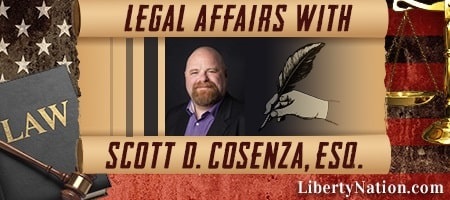Laredo’s “Lagordiloca” won a victory for freedom of speech and struck a blow against official oppression and police-qualified immunity. Much like Donald Trump, Priscilla Villarreal was prosecuted by authorities, who disliked her threat to their power, via a novel application of the law. It was used in a preposterous way to punish behavior that is not even objectionable, much less criminal. She was prosecuted for asking a government official to comment on a story. The shocking thing is, there’s not more to it than that. Her case was tossed around until Tuesday, Oct. 15, when the Supreme Court, without dissent, came down with a pro-freedom ruling.
‘Lagordiloca’ is a Journalist
Ms. Villarreal does her reporting via social media posts. The New York Times called her “arguably the most influential journalist in Laredo, Texas” and a “swearing muckraker.” Her style is free-form, without editorial oversight, and ranges from profane gossip to hard-hitting exposés of local officials. That criticism – and officials’ willingness to weaponize their offices in opposition to it – led eventually to Tuesday’s Supreme Court order. Instead of cleaning up their own behavior and offices, the officials, including two prosecutors and the police chief, conspired to manufacture her arrest.
Laredo police regularly harassed the reporter at the encouragement of police chief Claudio Treviño. District Attorney Isidro Alaniz and an assistant DA, Marisela Jacaman, poured over the statute books with Trevino to find any possible way to use some law to punish Villarreal. They came across a 23-year-old statute that local officials had never enforced. It was designed to prevent government corruption by prohibiting people from soliciting non-public information for their gain.
Texas Penal Code § 39.06(c) creates a felony for those who, “with intent to obtain a benefit,” “solicits or receives from a public servant information that . . . has not been made public.” For instance, you can imagine that a senior government regulator in the oil and gas sector could reveal information to a market player they could trade on to great fortune. Here, though, it was used against a reporter asking for a comment. She asked a police source for information on stories she covered – information that wasn’t publicly published – as any journalist would.
Supreme Court Puts Police in Check
Laredo police snapped cellphone pictures of her in handcuffs while mocking and laughing at her as she turned herself in after learning she was wanted. Ms. Villarreal beat the criminal charges when a state court judge found the statute unconstitutionally vague. Then came the battle for civil damages. She sued her persecutors in Federal Court for violating her First, Fourth, and Fourteenth Amendment rights. The district court granted the defendant qualified immunity, cratering her case.
Qualified immunity gives government officials immunity from suit if the way they violate someone’s rights isn’t “clearly established.” It is also maddening to individual rights advocates who see it as a judge-made law granting a free pass for the government to trample the people’s rights.

The Fifth Circuit Court of Appeals disagreed – denying the defendants qualified immunity, with an opinion stating, “If the First Amendment means anything, it surely means that a citizen journalist has the right to ask a public official a question, without fear of being imprisoned.” That wasn’t the end of it, however. A judge on the Fifth Circuit didn’t like that decision and got their colleagues to agree to re-hear the case en banc, where, instead of a three-judge panel randomly chosen from all the appeals court judges in the circuit, all the judges might participate. There were sixteen at re-hearing, where the vote was 9-7 to grant the defendants qualified immunity.
No Dissenters
Villarreal appealed that decision to the Supreme Court, which sent down an order vacating the qualified immunity ruling. They did not have a trial; the Court simply issued an order doing away with the en banc ruling, allowing the lawsuit for the civil rights violations to proceed. Lagordiloca’s case was filed by the Foundation For Individual Rights and Expression, which has now replaced the ACLU as the nation’s preeminent civil rights law firm.
Dig Deeper into the Themes Discussed in this Article!
Liberty Vault: 303 Creative L.L.C. v. Elenis
Liberty Vault: United States v. Alvarez




